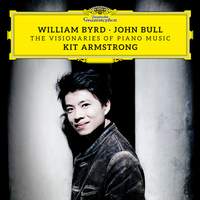Recording of the Week,
Byrd and Bull from Kit Armstrong
Today’s Recording of the Week is one of those albums (like Alexandre Tharaud’s Rameau from 2019 or Vikingur Ólafsson’s from last year) which will sharply divide devotees of early music right from the outset; American pianist Kit Armstrong performs the works of two of Tudor England’s finest composers on a modern grand piano, in a style that isn’t afraid to draw on the developments in instrument manufacture and performing technique that have taken place since the era of Byrd and Bull.
Indeed, Armstrong lays out his aims in recording this album in the very title; Byrd and Bull are dubbed the “visionaries of piano music” specifically, not of keyboard music, and he is at pains to locate them within the history of the piano rather than isolate them in an early-music bubble. Playing up the nuances and shifts of mood in these pieces, he emphasises their role in developing keyboard music into the self-expressive art form that would later gift pianists the emotionally-charged miniatures and heroic protagonist-concertos of the Romantic era.
 At times, for instance in the Pavan written for the teenaged son of his sometime patron and benefactor Sir John Petre, there’s a kind of weary melancholy worthy of Dowland, and which (dare I say it) is made even more powerful by the sustained, legato sound of the piano than it would have been on the plucked instruments of Byrd’s time. Armstrong also embraces the surprisingly intense virtuosity of the music, remarked on by the eighteenth-century music historian Charles Burney who contrasted its complexity with the less intricate pieces of his own time. Decorative scalar runs and trills could easily become a distraction from the melodic line (in Bull’s Melancholy Pavan they are particularly prominent) but in Armstrong’s assured hands they are integrated seamlessly into the musical fabric.
At times, for instance in the Pavan written for the teenaged son of his sometime patron and benefactor Sir John Petre, there’s a kind of weary melancholy worthy of Dowland, and which (dare I say it) is made even more powerful by the sustained, legato sound of the piano than it would have been on the plucked instruments of Byrd’s time. Armstrong also embraces the surprisingly intense virtuosity of the music, remarked on by the eighteenth-century music historian Charles Burney who contrasted its complexity with the less intricate pieces of his own time. Decorative scalar runs and trills could easily become a distraction from the melodic line (in Bull’s Melancholy Pavan they are particularly prominent) but in Armstrong’s assured hands they are integrated seamlessly into the musical fabric.
Set against the refined music of Byrd, who as Armstrong says “could not do otherwise but to make any musical utterance a satisfying and edifying composition”, that of John Bull often seems tinged with madness. His anguished chromatic Pavan dedicated to Queen Elizabeth (likely in a funerary capacity) plumbs depths of grief not often encountered in Tudor keyboard music, while his innovative, experimental and sometimes baffling canons based on the Miserere plainchant melody push the musical rules and conventions of his era to breaking point. Armstrong does not shy away from the neurotic elements of this music, which he describes as containing “shouts and wails” – very far from the comfortably domesticated kind of music one might expect of the English virginalists. Yet at the same time, nothing about his playing breaks his self-imposed definition of authentic faithfulness; no lurid over-use of the pedal, no overwrought climaxes.
In the light of this Bosch-like grotesquery, Byrd’s music might seem overly abstract and rarefied by comparison; but this is by no means the case. His vividly pictorial The Battell: The Flute and the Droome has an earthy liveliness, with the piano’s sonority emphasising its striking similarity to Grieg’s Wedding Day, and The wood so wild has a pleasing rustic swagger that opens out into a triumphant finale. The Bells is no less colourful, though bears little resemblance to the joyous peals that the title might suggest; rather, Armstrong creates a rippling moto perpetuo that rarely rises above mezzo-piano.
Towards the end of his life, Bull’s fantastical imagination seems to have mellowed and given way to an interest in harmonious simplicity; his Telluris ingens conditor variations (of which Armstrong performs a selection here to close the album) are thought to be among his last works, and provide a satisfying circularity to the programme as they see him evolve away from an unhinged idiom worthy of the infamous Gesualdo towards an assured, grounded style that converges on Byrd’s.
Eagle-eyed readers may have spotted that this album has already made it into the Top 10 Presto Recordings of the Year; released in August, it has been slowly but surely working its magic on the Presto team over the ensuing months. Whether you’re a Romantic piano lover who eschews anything pre-Mozart, or an early music fan who finds even the fortepiano a stretch, I guarantee there’s something on this album that you’ll find illuminating and enjoyable.
Kit Armstrong (piano)
Available Formats: 2 CDs, MP3, FLAC



